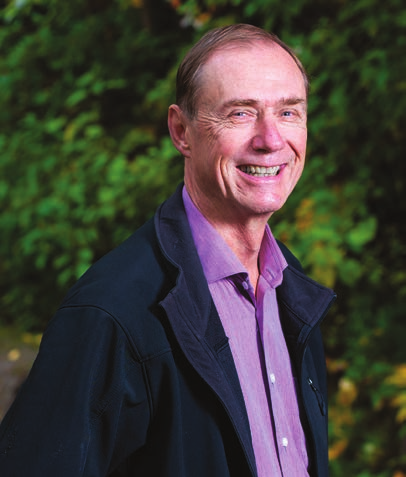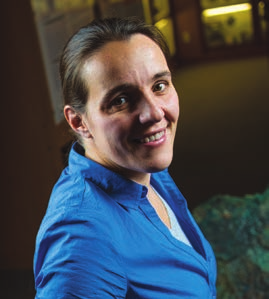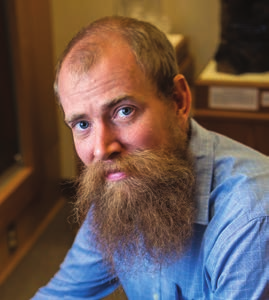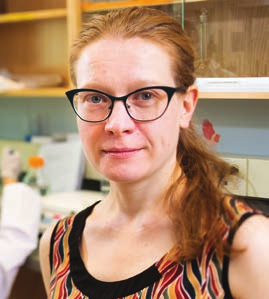In every rock, in every local miner, and in every geology student, Godfrey Walton ('74 BSc) hears a story and sees potential. Walton's way of perceiving the world-and the way it has influenced how he runs his company, Endeavour Silver-signifies a shift in the mining industry. For decades, the industry has faced harsh criticism. But under Walton's leadership, Endeavour Silver is contributing to turning the tide toward a mining industry that is sustainable in more ways than one.
For Walton, the focus is not only on developing sustainable practices but also on empowering people to build sustainable communities that will long outlast the life of a single mine. Much like the proverbial rolling rock, the momentum for Walton and Endeavour's efforts only grows.
"It's a complete switch in ideas," says Walton from his Vancouver headquarters. "There has been a lot of discussion and evaluation throughout the mining industry with people looking at ways to be sustainable. How can we do it, and what are the best ways to move forward with this process. Most of the places we go, there's no other industry, so you're trying to create jobs and wealth for people in areas where there is nothing else. There are no other industries that are going to go there until the mining industry develops some initial prosperity for the local people."
Walton recounts the story of Guanacevi, Mexico, where for 15 years Endeavour has operated a silver mine.
People, prosperity, potential
"When we first arrived in Guanacevi, the town was maybe 2,000 people," says Walton. "There was a lot of cartel activity around the area, so the only opportunities people had were to move to the States or get into drugs. We started working away, and we were successful and able to expand the mine, and it's been going now for 15 years. You go to the community now, and there are all sorts of small business and prosperity. We've got all sorts of people coming back from the States, and the place is prospering. It's amazing to see that this mine can create so much prosperity and opportunity around it-not just salaries, but a number of other small businesses. And it shows that you can go into a community and get everybody aligned and provide guidance to see them blossom. It's thrilling to see people being able to provide a better environment for their families."
"It's thrilling to see people being able to provide a better environment for their families."
For Walton, as for Endeavour, the focus is also on empowering local communities to sustain themselves beyond the life of a single mine. And for that, he's listening to the locals.
"We've always felt it's important to talk with the local communities and get them involved. In these discussions, the two requests we've had were that they want education for their kids, and they want training so that they are employable. We established scholarships at all our sites so that children can get books and clothes and go to school from kindergarten up to the end of high school. And where we are actually able to start mining, we hire as many local people as possible. They want training to be able to go out and get jobs in other areas, since eventually the mines will close down, despite the fact that the mines have been going for 400 or 500 years. We are very much focused on how do we create something that they can use in the future."
Focus on the future
Walton's focus on the future features not only people but also place. More specifically, the entire planet. His specific vision of supporting future generations of field geologists is key to sustaining the growing change in the mining industry toward sustainable solutions and safer practices
"In the early days, people were much less focused on the environment and safety. And that's why mining has got such a bad reputation. Nowadays mining has basically switched to the other side. It's now very much focused on sustainability, focused on the environment, and making sure that we don't create problems for future generations.
"Field geology is critical. To me, the most important part of becoming a geologist is actually getting out in the field. A geologist needs to look at rocks and understand what they're saying."
Speaking of future generations, Endeavour Silver has recently signed on to support Walton's alma mater, the University of Alberta, in the creation of a new economic geology field school running at one of Endeavour's Mexican mine sites starting next May. Because for Walton, the key to success is simple.
"Field geology is critical. To me, the most important part of becoming a geologist is actually getting out in the field," says Walton. "A geologist needs to look at rocks and understand what they're saying, Every rock has a story. I've always believed it's so important to be out in the field, and it's something that I still prefer to do. I don't like sitting in an office. I much prefer to go to a site either into the mines or with the exploration crew and look at the mines and rocks to understand what the potential is for that block of ground. And that is what I want to have happen in this field school. Our program is for people to go to mines, to understand the systems, and to be able to figure out what the conditions for mineralization are and how to find more of the same mineral. Future generations of geologists need to find minerals that are buried, so they need to understand how to do that and where to go to find the mineral, and that is where understanding of the mineralized deposits is critical," says Walton. "They need to understand what created that deposit. That's what has driven our success, and that's what we want to give back. That's what we want to have for the next generation. We're desperately short of people in the industry. So it's important for the future, because it brings wealth and prosperity to places that don't have any opportunity.
Meet the new economic geologists
Want to help keep our geology program ranked fifth in the world? Contact give2sci@ualberta.ca to learn how you can support undergraduate field school opportunities.
With a leading reputation for research on Earth's energy, mineral, water, and soil resources, the University of Alberta is ranked fifth in the world for geology according to the Center for World University Rankings. Meet the new economic geology professors, who are exploring novel and sustainable solutions in resource extraction and demonstrating the department's commitment to the responsible characterization, extraction, and environmental monitoring of these resources:
On the trail of tungsten
Pilar Lecumberri-Sanchez is on the hunt for critical metal-bearing mineral deposits, while navigating not only economic but also environmental needs. The geologist focuses on using fluids found in geologic deposits to understand where metals are found, including critical metals such as tungsten, which occur in very few localities in the world, including China, Portugal, and the Northwest Territories and Yukon in the Canadian North. Lecumberri-Sanchez notes that Canada is viewed as a model for economic geology: maximizing economic impact while minimizing environmental impact. "There's a definite balance between providing economic support and also taking care of the environment. Canada is a place where people are putting a lot of effort into doing things right."
Hard rock meets heavy metal
"Picture the periodic table, and draw a box around the metals on it. Everything in that box is something that is needed for technology right now," says Matt Steele-MacInnis. "Whether it's massive amounts of iron for all types of infrastructure building or tiny but crucial amounts of rare earth elements to help power modern electronics, the world is recognizing there is a huge need for metals. Canada is a huge global player in the world of metals and mineral deposits. We are probably in the best position worldwide to really be at the forefront of what is happening with mineral deposits." Steele-MacInnis focuses on hydrothermal systems, specializing in the properties of water at high pressure and temperature, particularly when it crystallizes minerals to form a deposit.
Striking a balance: economics and the environment
"Anything can become a contaminant when a system is out of balance," Sasha Wilson says of the elements she studies. "It's all about context." Wilson investigates the balance between the economic and environmental aspects of geology, focusing on carbon sequestration and metal recovery. "I'm interested in improving environmental sustainability for the minerals industry, specifically using metal mobility for metal recovery and carbon sequestration. If there's an economic incentive to do something environmentally beneficial, it's more likely that these techniques will be adopted. The first step is finding out what those techniques might be."



